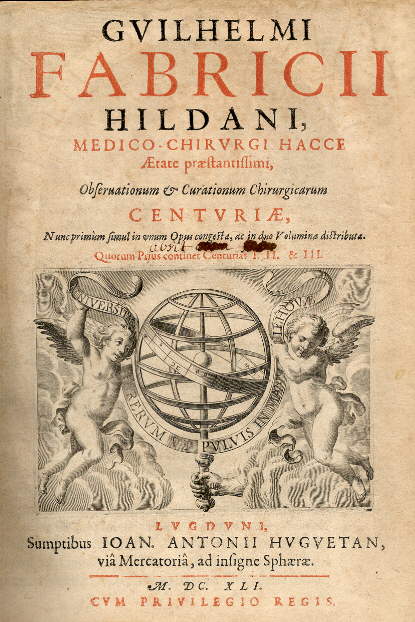Image and text preparation for
Internet presentation by
Roy F. Sullivan, Ph.D.
In her definitive text, Antique Medical Instruments (Sotheby Park Bernet; University of California Press, 1979), Elisabeth Bennion indicates that "The aural speculum was invented by Fabricius (1560-1634), city surgeon at Berne...". I have in my collection an original edition of the 1641 London, latin version of Wilhelm Fabricius Hildanus' text, the translated title of which is "Observations and surgical experiments...". Another copy of this rare volume in medical history is located at the National Library of Medicine in Washington, D.C. http://www.nlm.nih.gov/databases/locator.html.
AUTHOR Fabricius Hildanus, Wilhelm, 1560-1634 ³
³ Doring, Michael, d. 1644 ³
³ TITLE Observationum & curationum chirurgicarum centuriae [I-V] nunc ³
³ primum simul in unum opus congestae, ac in duo volumina ³
³ distributae. Quorum prius continet centurias I. II. & III.³
³ PUBLISHER Lugduni, Sumptibus Joan. Antonii Huguetan, 1641. ³
³ DESCRIPTION 2 v. in 1. : illus. ; 25 cm. ³
³ CALL NUMBER WZ 250 F127o 1641 ³
³ ACCESS History of Medicine Circulation Desk ³
³ NOTES "Epistola de nova ... herniae uterinae atque ... partus ³
³ caesarei historia ... a Michaele Doringio ..." [&] ³
³ "Guilhelmi Fabricii Hildani ... responsio epistolica ...": ³
³ p. [521]-568 at end of Centuria III. ³
³ Imperfect: port. wanting; Centuriae IV-V bound after title page.
|
A brief description (in Italian) of the contribution of Guilhelmi Fabricius Hildani (William Fabry of Hilden, Germany) can be found at http://www.medithema.it/lineamenti_storia/storia_15.htm. Translation as follows:
| "It is, at this point, opportune to cite Wilhelm Fabry, unanimously considered the "father of surgery in Germany ". He is best known as Fabricius Hildanus (He was born in Hilden, near Düsseldorf), and was truly the first well-educated and "scientific" German surgeon, in sharp contrast to the traditional figure of the nomadic, crude and most times uneducated, barber-surgeon. Fabry declared war on the ties of witchcraft to medicine; and had the foresight to document more than six hundred cases which were published in the Observationum, leaving here a precious documentation of the state of surgical art in that period. Many of his observations appear today as remarkably ahead of his time, for example the opportunity to execute an amputation through the healthy tissue (diverging from contemporaries who preferred to remain as close as possible to the infected area, if not quite at its margins)."
|
High resolution scans are presented from two full pages containing the text and woodcuts of the first aural speculum and aural surgical instruments. This 1641 text also presents case reports of otic disease including noise-induced deafness in a bell-ringer.
Roy F. Sullivan, Ph.D. October 18, 1998
Garden City, New York
Click "BACK" to return to this page.
|

